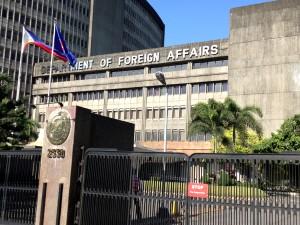
DFA building in Pasay City. INQUIRER.net FILE PHOTO
MANILA, Philippines — The Department of Foreign Affairs (DFA) will have to tend to the safety or repatriation of more than 3,000 overseas Filipino workers — twice the official figure of 1,640 — should hostilities break out in Iraq between the United States and Iran.
In a statement on Sunday, Filipino recruitment consultant Emmanuel Geslani corrected the DFA’s official figure, comprised of 1,190 documented and 450 undocumented workers.
Geslani, who claimed he was in constant communication with Filipino workers in Iraq, said about 1,500 to 1,800 Filipinos worked in US bases in Baghdad. The DFA on the other hand claimed 847 Filipinos were in the Baghdad area working in US and other foreign facilities.
Base workers safe
There is no need to repatriate Filipino base workers, Geslani said, since they are safe inside the fortified bases and their employers are obligated to move them to a safer location in case their job sites are no longer safe.
Geslani said more than 500 Filipinos work in Kurdistan, which is far from Baghdad and relatively safe.
He said those who might need repatriation were the mostly undocumented maids who numbered about twice the DFA’s estimate of 450 illegal workers.
These undocumented workers managed to slip into Iraq despite the Philippines’ ban on deployment of new workers since 2014.
“Most of the Filipinos who have managed to slip into Baghdad undocumented come from Dubai where international contractors are recruiting workers for Iraq and Afghanistan,” Geslani said.
The ban does not cover Filipinos who work for international contractors hired by the US military.
POEA-deployed workers
The DFA’s count of Filipino migrants in Iraq is lower than the actual figures because the department only monitors the documented workers who pass through the Philippine Overseas Employment Agency (POEA) as re-hires of the bases and international organizations in Baghdad, Geslani said.
The POEA has no record of any new deployment to Iraq since 2014.
“Their estimate for undocumented [workers] is merely a guess,” said Geslani, who has been working for the right of Filipino migrants to work in Iraq and Afghanistan where there is also a ban on the deployment of new workers.
The DFA on Friday placed Iraq, except the Kurdistan region, under Alert Level 3 (out of four alert levels), which called for voluntary repatriation.
The DFA also advised Filipinos in Iraq to coordinate closely with the Philippine Embassy and their employers in case mandatory evacuation will be necessary.
Foreign Secretary Teodoro Locsin Jr. said the DFA was ready with contingency measures, but added that some longtime migrants choose to ignore “pointless evacuations.”
“We will get out everyone who wants to get out and return to poverty in the Philippines to stare at their starving loved ones while bullshetters talk about the most dynamic economy in Southeast Asia. Or we will be there with them,” he said on Twitter on Sunday.
‘Relocation’
Many Filipino migrants in the Middle East prefer relocation to repatriation, according to labor group Trade Union Congress of the Philippines (TUCP).
Alan Tanjusay, spokesperson for the group, said on Sunday that the TUCP learned through a teleconference discussion with migrant groups in Jordan and Qatar that the Filipino workers preferred to work in other countries in the region than be evacuated to the Philippines because jobs were scarce in their own country.
He said the migrants also cited higher pay and better benefits in other countries than in the Philippines.
Tanjusay, however, said the TUCP did not know whether relocation instead of repatriation was possible under current migration rules.
The government estimates that there are 1.2 million documented Filipino migrants in the Middle East.—With a report from Tina G. Santos

